 Petzlover
Petzlover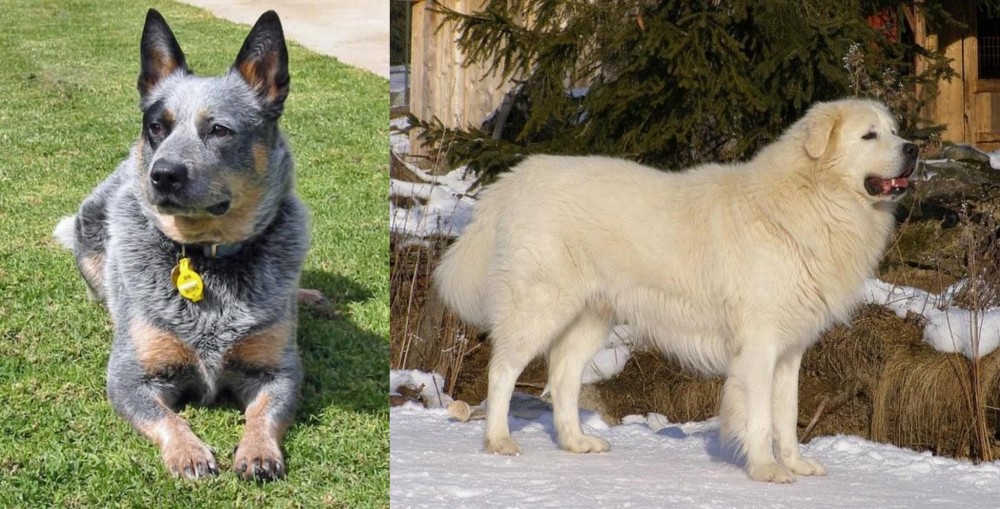 Queensland Heeler is originated from Australia but Slovak Cuvac is originated from Slovakia. Queensland Heeler may grow 19 cm / 7 inches shorter than Slovak Cuvac. Queensland Heeler may weigh 22 kg / 48 pounds lesser than Slovak Cuvac. Both Queensland Heeler and Slovak Cuvac has almost same life span. Queensland Heeler may have less litter size than Slovak Cuvac. Queensland Heeler requires Low Maintenance. But Slovak Cuvac requires Moderate Maintenance
Queensland Heeler is originated from Australia but Slovak Cuvac is originated from Slovakia. Queensland Heeler may grow 19 cm / 7 inches shorter than Slovak Cuvac. Queensland Heeler may weigh 22 kg / 48 pounds lesser than Slovak Cuvac. Both Queensland Heeler and Slovak Cuvac has almost same life span. Queensland Heeler may have less litter size than Slovak Cuvac. Queensland Heeler requires Low Maintenance. But Slovak Cuvac requires Moderate Maintenance
 Another name for Queensland Heeler is Australian Cattle Dog or Blue Heeler.
Another name for Queensland Heeler is Australian Cattle Dog or Blue Heeler.
These dogs have always been known for herding cattle. The term ‘Heeler’ comes from the dog’s working style – nipping and biting at the cattle’s hooves.
He was was an Australian cattle dog for Australian settlers in the 1800s. It is believed that Thomas Hall created one of the foundations of the Australian Cattle Dog breed by crossing crossing sheepdogs with Dingos.
The Blue-colored dogs have been the most popular, being known as the Blue Heeler.
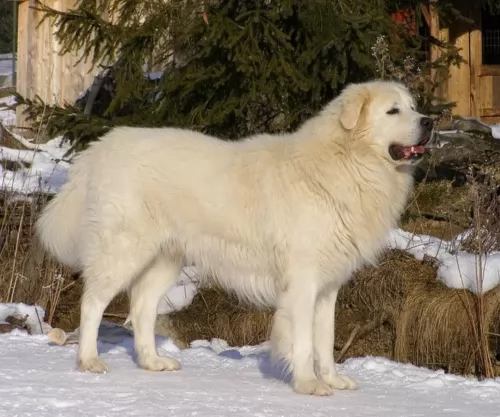 Looking quite a bit like the Pyrenean Mountain Dog, the Slovak Cuvac is a large dog that has served as a guard dog. The Slovensky Cuvac is still used on sheep farms as he isn’t afraid of wolves and bears and will take them on if needs be.
Looking quite a bit like the Pyrenean Mountain Dog, the Slovak Cuvac is a large dog that has served as a guard dog. The Slovensky Cuvac is still used on sheep farms as he isn’t afraid of wolves and bears and will take them on if needs be.
Records of this dog have been kept since the 17th century already, and when the breed started dying out, a certain Dr Antonin Hruza put in efforts to revive the dog.
The registered breeding of the Slovensky Cuvac was established in Czechoslovakia and a club for the dog was established in 1933. A written standard was established in 1964. The dog is not recognized by the Fédération Cynologique Internationale.
 The Queensland Heeler is a medium sized dog that stands between 43 and 51cm in height, both male and female. The dog weighs in the region of 15 to 22kg.
The Queensland Heeler is a medium sized dog that stands between 43 and 51cm in height, both male and female. The dog weighs in the region of 15 to 22kg.
He has a short double coat with colors being blue, mottled blue and also red speckled. You’ll also find black and tan coloring on this active dog.
He is strong, lean and muscular with medium sized ears that are erect. The eyes are dark and alert, the legs straight and strong. The tail can be docked or left long.
The Australian Cattle Dog is a high-energy working dog that you won’t easily find lying around. The alert eyes are consistently looking around for action and he can’t be bored otherwise he could resort to digging or other destructive behavior.
He is loving to his entire human family, but being particularly attached to just one family member. He is also protective, taking his guarding role of his family seriously.
He gets on well with children and other pets but you’ve just got to keep your eyes on him around children as when excited he can give a nip or two.
Training and socialization will be important for this dog, particularly because he can be strong-headed, willful and stubborn.
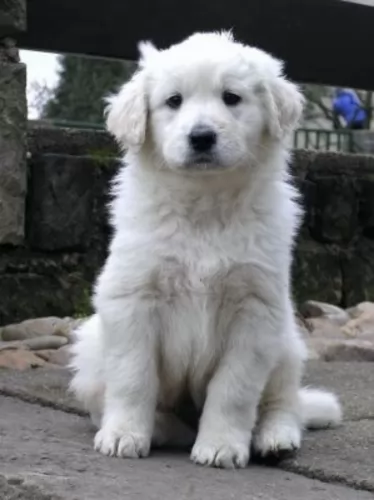 This is a large dog standing at between 59 and 70cm in height and weighing between 31 and 44kg.
This is a large dog standing at between 59 and 70cm in height and weighing between 31 and 44kg.
The neck is broad and has quite a bit of fur around it. The head is large, the eyes dark brown, the double coat is white and thick and medium length. The eyes are brown, the ears medium length and floppy and the tail long and furry.
This is a robust dog, used to spending time outdoors keeping watch over livestock. When he is invited into the home, he is gentle and well behaved, more so when he has been trained and socialized.
He is loving and loyal towards his human family and will get on well with children in the home. He isn’t the brightest dog but you can still have him trained.
 Active, intelligent, feisty, brave, playful, loving – these are just some of the wonderful characteristics you get when you bring a Queensland Heeler into your home.
Active, intelligent, feisty, brave, playful, loving – these are just some of the wonderful characteristics you get when you bring a Queensland Heeler into your home.
True, he is independent, self-willed and stubborn, but training and socialization can take away all the rough edges.
He forms a strong bond with his human owner, and once you’ve had one of these amazing dogs in your life, you’ll be convinced that dogs are truly man’s best friend.
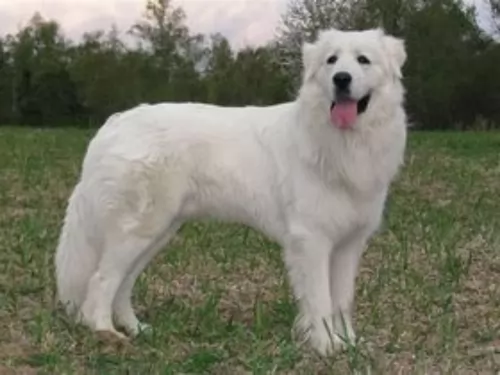 Your playful Slovak Cuvac is an affectionate dog, wanting nothing more than to be totally involved in his family’s life.
Your playful Slovak Cuvac is an affectionate dog, wanting nothing more than to be totally involved in his family’s life.
He is social and loving and also makes an excellent watchdog. He’s a big dog so think carefully before you bring him into your home. Many dog owners like the look of a big dog and forget that it costs a lot of money to feed a big dog and to pay for vet fees.
This big dog is wanting to be part of your family and not just to be discarded when you find that he is costing you too much.
 Australian Cattle Dogs are healthy. Every dog, even the most healthiest breeds, can succumb to some of the common dog illnesses there are.
Australian Cattle Dogs are healthy. Every dog, even the most healthiest breeds, can succumb to some of the common dog illnesses there are.
This is an inherited condition, so if you’re looking for a puppy, be careful about the breeder you buy from.
This is another inherited condition where the thighbone of the dog doesn't fit properly into the hip joint. Your dog is usually so active but with this problem he may well be in pain and actually be lame. Your pet can even develop arthritis . The idea is to get your pet to the vet because it can be unbearable to see him in pain and unable to get around.
This eye disease can mean deterioration of the retina. You'll recognize the signs when you see your dog unable to navigate around your home during the night. He is night blind but later on he can’t see during the day either.
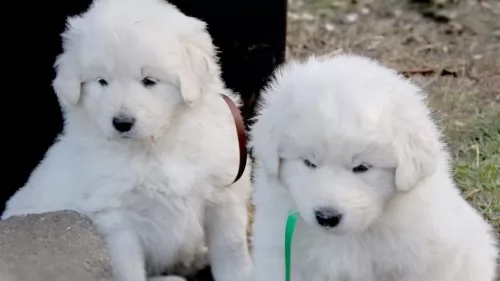 This is a healthy dog breed, but as with many large dogs, hip dysplasia is a threat. Hip dysplasia is always reason for concern as the condition can reduce a dog’s quality of life.
This is a healthy dog breed, but as with many large dogs, hip dysplasia is a threat. Hip dysplasia is always reason for concern as the condition can reduce a dog’s quality of life.
It is distressing seeing your once active pet becoming reluctant to play and move around.
Canine hip dysplasia is a common skeletal condition. It can strike any size dog but is more prevalent with large dogs. The ball and socket of the hip doesn’t fit properly and deterioration sets in resulting in loss of function of the joint.
You will need to get your dog to the vet who will perform a physical exam and discuss treatments to alleviate the pain your dog can experience.
 To cope with his life on the Australian Outback, the Queensland Heeler is known to be a low maintenance dog.
To cope with his life on the Australian Outback, the Queensland Heeler is known to be a low maintenance dog.
The thick coat does shed and it can get dusty so a good brush twice a week is all that is basically required for this dog. If his nails don’t wear down naturally, you will need to have them trimmed. As with every dog, you will need to give attention to his ears and teeth.
This is an extremely active dog. He is going to be needing both mental and physical stimulation to avoid boredom, after all he is used to an active lifestyle herding cattle. Hikes, swimming, running – you name it – he’ll join you with all your activities.
Your Queensland Heeler is such a vibrant dog, full of the joys of living, and you want to ensure he has good food to eat to ensure he stays like that.
For convenience you get some excellent commercially manufactured dog foods. Your Blue Heeler is such a wonderful companion dog that you want to spoil him a bit and give him some delicious home-made food too. Boiled chicken, brown rice or pasta and spinach, sweet potatoes and carrots are a healthy choice for your pet – plain and simple just like dogs love it. Chop it up and add it into the high quality dry kibble a couple of times a week.
Some raw meat added in from time to time will help his skin and coat remain healthy. Never leave him without a constant source of fresh, cool water.
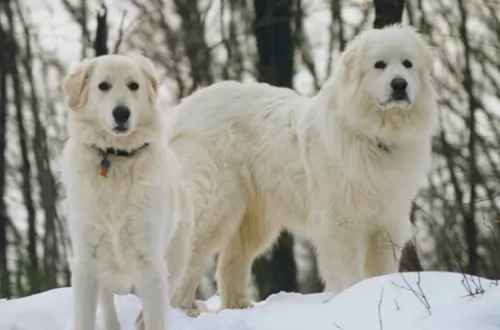 ◆The thick white hair will require regular grooming to keep it free from burrs and dirt. He sheds so this brushing will help him to look more groomed.
◆The thick white hair will require regular grooming to keep it free from burrs and dirt. He sheds so this brushing will help him to look more groomed.
◆The nails should be trimmed regularly and the ears too should be checked for redness and infection. You’ll need to look inside his mouth too as a rotting tooth can cause havoc within his body. A rotten tooth can also cause him tremendous pain and he has no way of telling you this.
◆Have your pet spayed or neutered if you don’t want any puppies. This is better for your dog’s health in the long run too.
◆Your Slovak Cuvac is going to need a lot of exercise as they have always been used to roaming the mountains watching over livestock.
◆This is a big dog so if you buy commercially manufactured food, make sure its for large, energetic dogs. There are good commercially manufactured dog foods on the market – just make sure you buy the best one for your pet to enhance health and longevity.
Try and give him some home made food too. Healthy food which won’t jeopardise his digestion is boiled chicken, brown rice or pasta and spinach, sweet potatoes and carrots. These can all be chopped up and small portions mixed into the dry kibble twice a week as a treat.
Try and include some raw meat occasionally. Your dog will thank you for not giving him exotic people foods which can do lots of harm. Ensure there is always a bowl of fresh, cool water within his reach.